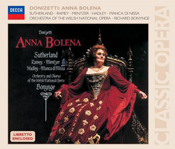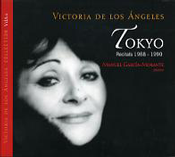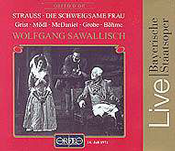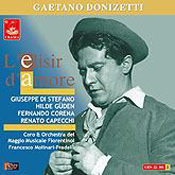It confirmed three wisdoms I thought I knew about thanks to voracious
reading. The sets and the actors clearly told me that it was a Swiss medieval
drama and not the second Arab intifadah against Israel. The singers and
especially Tony Poncet, the legendary last of a line of French fort tenors,
exactly sounded live like their (his) singing on record; big voices and
blazing top notes. And, confirming operatic lore, the house came down after
ëAsile hÈrÈditaireí and of course Poncet encored the aria. Little did I
presume I witnessed a moribund tradition. Most composers wouldnít recognize
their own works if they didnít hear the music. A small voice like
Bartoliís sounds like Simionato or Cossotto. And in al these years of opera
going this was the first and the last encore I ever got in a house (The
Verona arena where Bergonzi and Domingo often encored and Corelli twice
caused an uproar by refusing doesnít count in my opinion as a regular
theatre). At the end of the performance the Ghent Opera was on its feet.
This long introduction just serves to tell that I learned my Tell in the
original language while, contrary to many especially Anglo-Saxon critics
often unable to order a cup of coffee in French, I have no problem at all
with an Italian version in general and this one in particular. Especially as
I find back in this recording the generosity of delivery, the enthusiasm and
the size and sound of extra-ordinary voices also present in the long ago
performance. I possess and like the French language version on EMI (and it
has an extra aria for Jemmy as a bonus) but Gardelli, Bacquier and Gedda are
not in the same class as Chailly, Milnes and Pavarotti. The tenor, at the
time only 45, was in his best voice. The sound is strong, not too subtle
(after all he is promising vengeance to his death father) and typical of
Pavarotti in his best years .He has the necessary ardour in his big duet with
Milnes (reminding me of the classic Martinelli-De Luca recording) but the
sweetness and lyricism as well in his love duets with Freni. Moreover
Pavarotti and Freniís voices blend so well. Gedda, for all his qualities,
was essentially an non-Mediterranean tenor and for my ears he sounded too
white , especially near partners like Callas, Freni or CaballÈ on the
EMI-set. Freni, 45 too, is still her eager youthful self, pouring out beauty
of tone in each note. And we get the often cut second Arnold-Mathilde duet.
Milnes indeed sings somewhat too straightforwardly. He has not got the
subtlety of Bacquier (and not the insight and mezza-voce Gobbi delivers in
his famous 78-recording) but he brings with him the big sound, obviously
lacking in Bacquier, to show off the rage of Tell. All other roles are cast
from strength. Ghiaurov is a noble Melchtal and Mazzoli sounds the
appropriate ruffian as Gessler. Della Jones is even a de luxe Jemmy and so is
Elizabeth Connell as Edwige. When the set first appeared Chailly was accused
of driving his forces unmercifully, making Rossini sound somewhat like middle
Verdi. Indeed the conductor has a tendency to hurry up, especially in the
first Arnold-Mathilde duet ( One admires the breathing capacities of tenor
and soprano.) but it still suits the opera. This is not Barbiere anymore but
a genuine new style for Rossini. It was his first French Grand OpÈra though
he didnít invent the genre as Auberís La Muette de Portici is one year
older. But the style of composing with its stress on dramatic accents is
closer to Verdiís Oberto (only nine years younger) than to other
Rossiniís operas. What a pity the revolution of 1830 killed Rossiniís
contract for five operas as the second one after Tell would have been
Faust.
Common wisdom has it that a critic should always trust his own ears and
not repeat along what others have said before. But common wisdom is often
scarce in music criticism. When early 2005 the soprano died after a tragic
life (a whoring gambling husband, one son who died young and another one
mentally retarded) I wrote a long obituary for a Dutch magazine, telling that
De los Angeles had to sing for money into her old age (true) with a thread
(not true and repeating others) of what was once a luminous voice. The first
Schumann songs on this CD initially confirm my lines; just a light and
somewhat colourless voice. But by track 4 Der Nussbaum the voice has warmed
up and once again there is that sweet sound, full of feminine charm; so very
much like the young De los Angeles even at 70 (and sad to say, the photo
proves that her tragedies have taken its toll as she is almost
unrecognizable). She has wisely chosen songs (or has them transposed) that
lie safely in her middle voice but wasnít she always somewhat weak above
the stave ? Some of these songs she recorded in her heydays and the
differences are not very marked. But the sum of this recording is more than
the separate part and it is the whole package that counts: a much beloved
older lady who still proves she has the goods and who shares them with an
appreciative public.
 Gaetano Donizetti: Anna Bolena.
Gaetano Donizetti: Anna Bolena.
Joan Sutherland (Anna), Samuel Ramey (Enrico), Susanne Mentzer (Giovanna), Jerry Hadley (Riccardo), Bernadette Manca di Nissa (Smeton), Giorgio Surian (Rochefort), Ernesto Gavazzi Hervey).
Orchestra and Chorus of the Welsh National Opera conducted by Richard Bonynge.
Decca 475 7910 6 [3CDs]
When Decca signed up Elena Suliotis in 1965 she got a contract for 4
complete operas. The reviews for the second one (Norma) were devastating,
partly due to producer Erik Smithís opinion that ìsome of the stage music
could be omitted with advantageî and that ìOrovesoís scene holds up the
great dramatic sweepî. The decision was made by Smith in advance and the
missing scenes are not in Deccaís vaults as I was told myself by Silvio
Varviso, the conductor. When two years later Decca recorded Anna Bolena
Varviso and his team were encouraged to leave nothing aside. As a result the
set was almost of Wagnerian proportions: 4 LPís and rather expensive. The
reviews were not better as critics wrote that in the few years since the
Nabucco recording the voice of Suliotis was rapidly declining and her
capacities for bel canto were small. Decca then waited 17 years before they
once again recorded the opera as Joan Sutherland preferred to tackle the
score in the house first. At Covent Garden scenery, costumes and the
outpouring of love for their own prima donna made their due impact but on
record visual and emotional elements donít play a role. Therefore this
recording made in 1987 simply came ten years too late. From the outset and
till the last bar the voice of the soprano sounds a little bit fragile. There
is even a permanent little wobble. There is still some silver in the sound
but one may not compare it with that firm sure-footed voice of the sixties.
The moment Dame Joan launches into a cabaletta the cleanliness and surety of
attack is lacking. One hears the careful way she handles the notes and the
aplomb of earlier recordings is absent. As a result the madness scene at the
final comes out with the best results as here one ëcouldí argue that the
lack of poise is wilfully introduced. By the end of the eighties the Bonynges
lacked the clout they once commanded at Decca and as a consequence they
couldnít commandeer other and more worthy partners. John Alexander in that
first Decca attempt was not everyoneís dream of a great tenor but at least
he had style, easy topnotes and a well rounded though somewhat indistinct
voice. Jerry Hadley is simply out of his league in this role. His white
bleat, his overblown small voice (lot of help from the Decca engineers) and
thick and difficult top is unsuitable. He was a good operetta tenor but by
the time he started his career classical operetta and musical almost had died
and therefore he could only earn his pay checks by singing opera. Of course
Riccardo Percy would have been an ideal vehicle for a younger Pavarotti but
at that moment in his career the gentleman would sooner have ended it than
study a new role for a recording. Nor is mezzo Susanne Mentser a substitute
for Marilyn Horne. A vibrato fan like myself likes her fresh, youthful and
very believable assumption of the role though her top thins rather quickly
but a quick vibrato is not to everyoneís taste. Best of the lot is Sam
Ramey at the height of his powers. Though the voice never rolled along with
the majestic volume of Nicolai Ghiaurov in the first recording, Ramey is the
far more interesting artist. At times venomously, thundering, charming he
puts forward a full portrait of the English king. Richard Bonynge doesnít
indulge his wife overmuch. Of course he takes care not to overwhelm her or to
ask for impossible quick tempi which she can no longer follow but he still
succeeds in giving us the flow of the music without making things too easy
for the star. But a missed and over late opportunity this recording is and we
are still waiting for one worthy of the music. The Callas-Simionato recording
is fine for the fans of the two ladies but almost an hour of music was
savagely cut by Gavazzeni. Sills in the 72-set is a few years past her
absolute prime and so is Gruberova in the 94-recording. So we still have to
wait for another generation and a new attempt.
Richard Strauss: Die Schweigsame Frau.
Kurt Bˆhme (Sir Morosus), Donald Grobe (Henry), Reri Grist (Aminta),
Martha Mˆdl (Haush‰lterin), Barry McDaniel (Barbier), Benno Kussche
(Vanuzzi).
Chorus and Orchestra Bayerischen Staatsoper conducted by Wolfgang
Sawallich.
Live performance of July 14th 1971.
Orfeo 2CD 516 992 I
Thereís a chapter in Christa Ludwigís autobiography called ëDie
Schweigsame Frauí and written by her son. It doesnít deal with the opera
and in it he tells us how much dialogue ëa silent womaní is able to hold
with just her eyes popping out and talking with her hands on a day of a
performance. I cannot say that silence is a quality of this opera but for
once Iím grateful for the conductorís scissors. Straussí version on the
same theme as Don Pasquale is long winded, noisy and in my honest opinion
utterly boring till the composer finally finds some inspiration in the second
and third act. I remember reading critic William Mannís (an unrepentant
priest of the Strauss cult) furious diatribe in the Festival issue of Opera
Magazine back in 1971. He called the performance ëa national disgraceí
because Sawallisch probably had the same feelings about the score as I still
have. Mann had a point. Either you like the music and then you perform it in
its entirety during a festival or you despise it and you leave it alone. But
cutting the score by one third doesnít seem to me to be the right decision.
Therefore people who want ëto enjoyí it should purchase the Janowski
version on EMI which lasts a full hour longer. Others who are less puritan
should tackle the Bˆhm version on DG. Only half an hour cut but the glorious
cast of Prey, Hotter, Gueden and Wunderlich will probably never be bettered.
Not that the recording under review is badly sung. Kurt Bˆhme has a fully
rounded authentic bass and is equal to his rivals on other recordings and
Reri Grist is her charming sprightly self. But Donald Grobe and his somewhat
artificial sound is no match for Wunderlich and Barry McDaniel hasnít the
sense of humour and the brilliance of sound which Prey shows in his every
utterance. So I fear this recording is redundant.
How badly informed can a recording firm be ? If one looks at the cover of
the jewel box one recognizes the well-known Decca performance of 1955. Fans
of Di Stefano will probably own either the original set or the re-issue on CD
and leave it well alone. But if one picks it up and looks at the back there
is that sentence in small print mentioning a bonus recital by the tenor and
Rosanna Carteri, first issued in 1958 and republished a few times on LP. Let
me tell you from the outset that this recital alone is worth the purchase and
then a complete set of Elisir as a bonus is quite good value for the money.
Iím not going to repeat all clichÈs on Di Stefano at that time of his
career. The too open throated sounds, the thickening of the voice above the
stave etc. are well known and true. But so is the exemplary and clear
diction, the beauty of the middle voice and the utter conviction he brings to
every duet on this record. The voice was too light for an Otello in the house
(but still more apt than Pavarottiís) but is deliciously lyrical in the
love duet. Compare Domingoís fine but all-purpose Osaka in the complete
Iris-set with Di Stefanoís far more expressive phrasing in this second act
duet. When the record first appeared Dutch critic Leo Riemens wrote he was so
immersed in it he almost expected the opera to continue on the second side of
the LP. Di Stefano is more than ably partnered by recently rediscovered lyric
soprano Rosanna Carteri (magnificent historical DVDís of Rondine and
Traviata). Iris is a little too heavy for the voice but as Desdemona,
Micalea, Leila and Marguerite she proves that Renata Tebaldi of the
mellifluous sound was not the only outstanding lirico in Italy during the
fifties.
The qualities of the Elisir set are well-known. Di Stefano is less the
country bumpkin than Pavarotti or Bergonzi made him in their recordings. He
may be simple but he is not a simpleton. The well-focused voice is splendid
notwithstanding the vocal faults. He can start a phrase with such a purity of
sound, such an easiness of emission that one indeed gets a little angry when
he strains for more decibels than necessary. Hilde Gueden sings charmingly
though in my opinion she sounds a little too ëWienerischí, not really an
Italian soprano. The skittishness of operetta is always lurking behind her
singing. I donít agree with other critics who think Capecchi not suited to
the role of Belcore. The voice is still a firm baritone and not the
bass-baritone of later years. He has the rolling sound for the role though
indeed there is not the smoothness in the sound that ideally belongs to a
fast talker as Belcore. For me the fly in the ointment is Fernando Corena. He
was considered to be the best buffo in the world during the fifties and there
were few Decca recordings without his contribution. But Dulcamara too is a
real belcanto role and Corenaís gruff delivery, without any real legato in
his phrasing, only makes a cheap clown of the good doctor. Dara, Capecchi and
definitely Taddei would later show how wonderfully human Dulcamara can be
sung. After all it is a role that reminds me a lot of Burt Lancasterís
classic and sympathetic assumption of the title role in ëThe Rainmakerí.
Francesco Molinari-Pradelli is a little too much of a routinier in this
repertoire. He was not a belcanto conductor (who was at the time ? ) and he
doesnít encourage his performers to add a little ornamentation. So indeed
this is Donizetti sung and conducted as Puccini. And Molinari is responsible
for the cut of maybe the most beautiful concertato of the opera in the last
act.
Jan Neckers
image=http://www.operatoday.com/Guglielmo_Tell.png
image_description=Gioacchino Rossini: Guglielmo Tell
product=yes
product_title=Gioacchino Rossini: Guglielmo Tell
product_by=Sherill Milnes (Tell), Luciano Pavarotti (Arnoldo), Mirella Freni (Matilde), Nicolai Ghiaurov (Gualtiero), John Tomlinson (Melchtal), Della Jones (Jemmy), Elizabeth Connell (Edwige). Ambrosian Opera Chorus and National Philharmonic Orchestra conducted by
Riccardo Chailly.
product_id=Decca 00289 475 7723 [4CDs]
price=$47.98
product_url=http://www.arkivmusic.com/classical/album.jsp?album_id=144812


